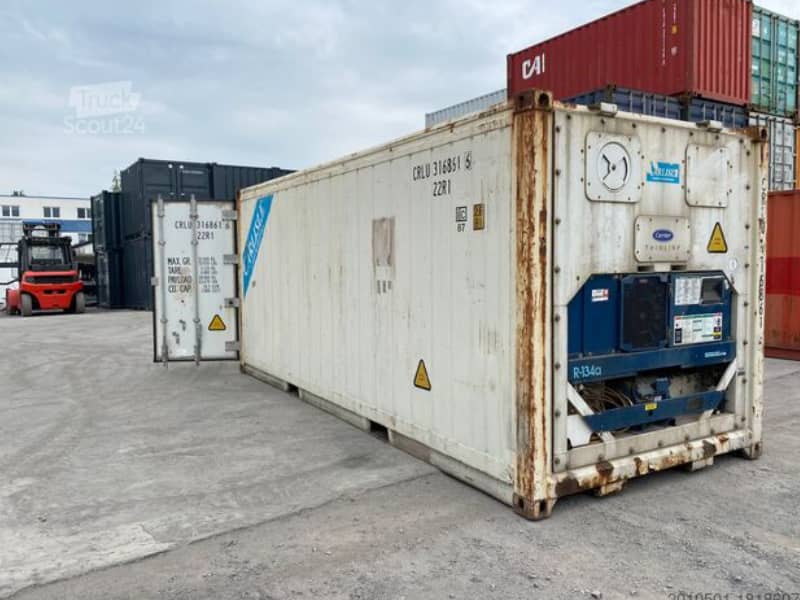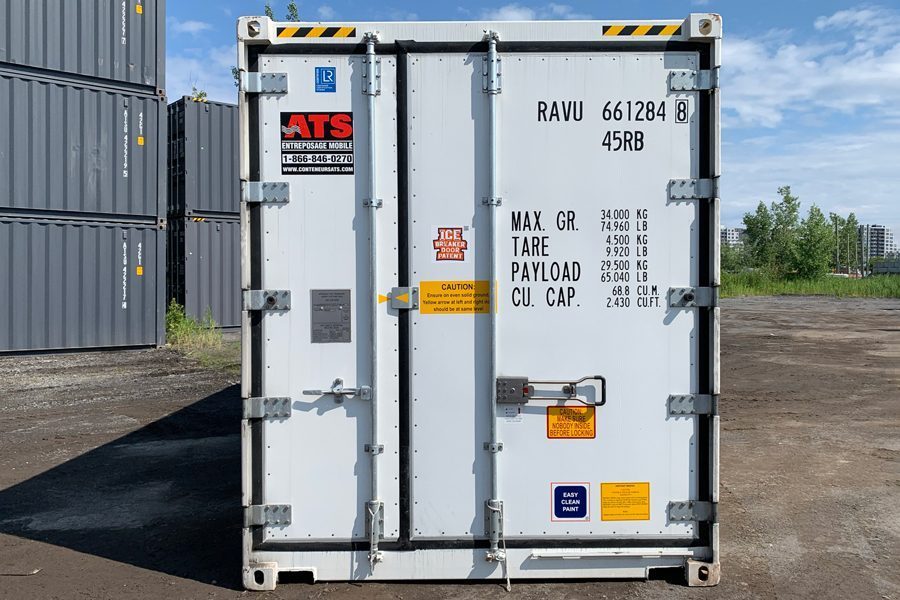All Regarding Cold Storage Containers: Crucial Insights for Your Storage Requirements
Cold storage space containers play an important function in the conservation of subject to spoiling products. They come in numerous forms, consisting of cooled and protected units, each developed for specific storage requirements. Understanding the benefits and key features of these containers is essential for organizations aiming to enhance their operations. As the need for effective storage remedies expands, exploring the different alternatives readily available can bring about notified choices that affect both profitability and sustainability. What variables should one take into consideration when picking the ideal container?
Kinds Of Freezer Containers
Freezer containers been available in various kinds, each made to meet specific temperature control demands. Among the most usual types are chilled containers, which maintain temperatures between 0 ° C to 10 ° C, making them appropriate for perishable items like fruits, vegetables, and milk products. An additional kind is the deep fridge freezer container, which operates at temperatures listed below -18 ° C, suitable for long-term storage of frozen things such as meats and fish and shellfish.
Shielded containers supply temperature level stability without active cooling, making them beneficial for temporary transportation of temperature-sensitive products. Additionally, there are portable cold store systems, which provide adaptability in locations and are often used in events or seasonal procedures. Blast chillers swiftly decrease the temperature of warm foods, ensuring safety and quality. Each kind serves a distinct objective in different markets, from food service to drugs, stressing the relevance of picking the appropriate container for specific storage space requirements.

Advantages of Using Cold Storage Solutions

Additionally, chilly storage space solutions expand the rack life of things, minimizing waste and enhancing earnings for businesses. By effectively handling supply with proper temperature level control, business can optimize their supply chains and boost functional performance.
Additionally, cold store centers enable flexible storage alternatives, suiting different quantity needs and seasonal variations popular (used 40ft refrigerated shipping containers). This flexibility assists organizations respond quickly to market adjustments
Employing cool storage space options can assure conformity with wellness and safety and security guidelines, safeguarding both customers and organizations. Generally, the strategic use cold store enhances product management while promoting sustainability and economic stability.
Trick Features to Try To Find in Cold Store Containers
When selecting cold store containers, several essential features benefit cautious consideration to secure peak efficiency and integrity. First, temperature control abilities are important; containers must maintain consistent temperatures suitable for particular goods. Insulation quality also plays a significant function, as premium insulation lowers power intake and improves temperature stability.
Next off, ease of gain access to and loading is crucial; containers ought to supply straightforward designs for reliable handling and company. Sturdiness is another essential facet; weather-resistant products guarantee longevity and protect materials versus ecological aspects.
Additionally, wheelchair features, such as integrated wheels or raising points, promote transport, while personalized layouts permit tailored storage space options.
Last but not least, keeping track of systems, consisting of temperature level alarms and remote tracking, provide real-time updates, making particular that problems continue to be perfect. By concentrating on these functions, users can pick chilly storage space containers that fulfill their functional demands properly.
Picking the Right Freezer Container for Your Requirements
Selecting the best cool storage space container needs a thoughtful assessment of operational needs and certain needs. Aspects such as the kind of items being kept, temperature sensitivity, and volume must be focused on. Perishable food items may require containers with rigorous temperature controls, while pharmaceuticals might require precise conditions to maintain effectiveness.
Additionally, possible customers need to consider the container's size and flexibility. A bigger system may be required for mass storage, while smaller sized, mobile options could be excellent for temporary or on-site needs. Insulation top quality and energy effectiveness are also important, as these will influence functional prices and temperature level security.
Compliance with industry regulations and standards is important, specifically in fields like food and medical care. By thoroughly assessing these aspects, users can select a freezer container that properly fulfills their distinct needs and guarantees ideal storage conditions.
Best Practices for Maintaining Cold Store Issues
Preserving suitable cold store conditions is necessary for protecting the quality and security of temperature-sensitive products. Regularly checking temperature and humidity levels is crucial; making use of dependable electronic thermostats and hygrometers can give precise readings. Proper insulation of cool storage space containers aids minimize temperature changes and power loss.
Implementing a first-in, first-out (FIFO) system assures that older supply is utilized prior to newer stock, decreasing waste (used 40ft refrigerated shipping containers). Additionally, preserving an arranged layout within the storage area enables for better air movement and lessens the risk of cross-contamination
Routine maintenance examine devices, such as seals and compressors, are necessary to avoid malfunctions. Personnel training on ideal techniques for loading and unloading products assists keep temperature level integrity. Keeping doors shut as much as possible restrictions warm exchange, assuring that the chilly storage setting stays efficient and stable in protecting beneficial items.
Cost Factors To Consider for Cold Storage Space Solutions
When assessing chilly storage options, it is necessary to take into consideration the initial financial investment costs alongside ongoing functional expenditures. A comprehensive breakdown of these prices can reveal significant long-term savings potential for companies. Recognizing these economic facets helps stakeholders make educated choices regarding their cold store requirements.

Initial Investment Expenses
The financial landscape of cold store containers provides numerous first financial investment prices that organizations have to think about. These expenses typically consist of the purchase or rental price of the containers, which can differ based here upon dimension, type, and insulation top quality. Furthermore, expenses associated with retrofitting existing structures to accommodate freezer has to be factored in, specifically if specialized equipment is needed. Installation expenses, consisting of electrical job and refrigeration systems, likewise add to the general preliminary financial investment. Companies ought to not neglect transport expenses for supplying containers to their wanted place. Lastly, prospective customization options, such as shelving or temperature level surveillance systems, can even more impact the initial monetary outlay. Cautious budgeting for these factors is necessary for effective chilly storage application.
Operational Expenditures Break Down
Operational expenses for cold storage space remedies include a number of essential price factors to consider that services need to browse. Secret factors include energy costs, which can be considerable due to the need to preserve reduced temperature levels. Upkeep expenditures are also significant, as normal servicing is important to guarantee tools operates effectively and stays compliant with health and wellness criteria. Furthermore, labor prices might arise from the demand for specialized team to keep track of the storage and manage environment. Insurance costs are one more consideration, as companies need to secure their investments against potential losses. Lastly, any type of possible regulative compliance prices have to be factored in, as companies may need to spend in systems that adhere to food safety and environmental regulations. Recognizing these expenses is essential for efficient budgeting.
Long-Term Financial Savings Prospective
Spending in cold store solutions provides substantial long-lasting cost savings potential, transforming initial expenses into economic performance with time. By decreasing wasting and waste, businesses can boost their revenue margins substantially. Advanced insulation and energy-efficient systems lower energy costs, which accumulate over the life expectancy of the tools. Cool storage space containers frequently require much less constant maintenance compared to standard refrigeration approaches, leading to reduced fixing expenses. The capacity to store products for extended durations without jeopardizing high quality permits companies to profit from market variations, optimizing revenue. In addition, the scalability of cold store remedies makes it possible for firms to adapt to transforming demands without sustaining excessive expenses. Overall, these aspects add to an engaging case for cold storage as a cost-efficient investment method.
Frequently Asked Concerns
How Much Time Can Food Be Saved in Freezer Containers?
The duration food can be stored in cool storage containers varies by type. Usually, perishable products last from days to weeks, while frozen foods can continue to be secure for months, depending upon correct temperature level and storage problems.
Are Cold Store Containers Energy-Efficient?
The power efficiency of freezer containers differs based on design and insulation top quality. Modern systems often utilize innovative innovation to lessen power usage, eventually contributing to decreased operational expenses and environmental effect in long-term usage.
Can Freezer Containers Be Custom-made for Certain Needs?
Cold storage space containers can indeed be personalized to satisfy details requirements. Adjustments may consist of temperature level controls, dimension modifications, and added attributes, allowing users to customize solutions properly for various storage space needs and functional choices.
What Are the Typical Sizes of Cold Store Containers?
Cold storage containers normally come in typical sizes such as 10, 20, and 40 feet. These measurements accommodate numerous storage demands, guaranteeing adaptability for businesses requiring temperature-controlled atmospheres for sensitive materials or subject to spoiling goods.
Do Freezer Containers Require Unique Permits for Use?
Freezer containers typically require special permits for usage, relying on local laws and intended applications. Authorities might mandate permits to guarantee safety and security criteria, environmental compliance, and appropriate functional methods are preserved during their application.
Cold storage containers come in numerous types, each developed to satisfy certain temperature level control requirements. Additionally, cold storage space centers allow for versatile storage options, fitting various quantity requirements and seasonal fluctuations in demand. Choosing the appropriate chilly storage container calls for a thoughtful evaluation of functional demands and specific needs. The financial landscape of chilly storage space containers presents various initial financial investment costs that organizations must consider. Cold storage space containers can indeed be tailored to fulfill specific demands.